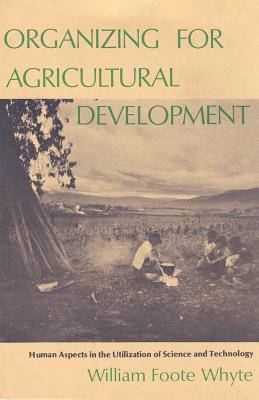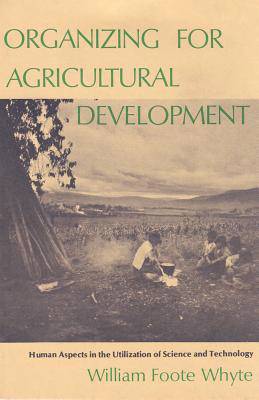
Door een staking bij bpost kan je online bestelling op dit moment iets langer onderweg zijn dan voorzien. Dringend iets nodig? Onze winkels ontvangen jou met open armen!
- Afhalen na 1 uur in een winkel met voorraad
- Gratis thuislevering in België vanaf € 30
- Ruim aanbod met 7 miljoen producten
Door een staking bij bpost kan je online bestelling op dit moment iets langer onderweg zijn dan voorzien. Dringend iets nodig? Onze winkels ontvangen jou met open armen!
- Afhalen na 1 uur in een winkel met voorraad
- Gratis thuislevering in België vanaf € 30
- Ruim aanbod met 7 miljoen producten
Zoeken
Organizing for Agricultural Development
Human Aspects in the Utilization of Science and Technology
William Foote Whyte
Paperback | Engels
€ 58,45
+ 116 punten
Omschrijving
There is increasing recognition, even among hard-nosed agricultural scientists, that progress in technology and in the scientific fields directly related to the growth of plants is necessary but not sufficient to produce major social and economic benefits. Agricultural scientists are therefore turning to behavioral scientists for advice and collaboration; they must search together for the solutions to problems of food shortages and rural development. Through an analysis of the procedures of agricultural extension agents, organizational frameworks. divisions of labor and social structures, William Foote Whyte proposes a reformulation of social theory that does not abandon humanistic values but requires us to examine the conditions and agencies for realization of these values by concentration upon the structural elements influencing behavior in agrarian societies. Only then can technological and agricultural innovations be introduced to rural areas with success.
Specificaties
Betrokkenen
- Auteur(s):
- Uitgeverij:
Inhoud
- Aantal bladzijden:
- 62
- Taal:
- Engels
Eigenschappen
- Productcode (EAN):
- 9780878555987
- Verschijningsdatum:
- 30/01/1975
- Uitvoering:
- Paperback
- Formaat:
- Trade paperback (VS)
- Afmetingen:
- 130 mm x 204 mm
- Gewicht:
- 89 g

Alleen bij Standaard Boekhandel
+ 116 punten op je klantenkaart van Standaard Boekhandel
Beoordelingen
We publiceren alleen reviews die voldoen aan de voorwaarden voor reviews. Bekijk onze voorwaarden voor reviews.











